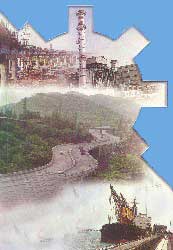 |
Depending on circumstances, economic decisions of Indian Muslims have been subject to compulsions. After independence of the country, their options were limited. Among the circumstances influencing their decisions, pride of place goes to partition and subsequently to Indo-Pak relations. They have never been in a position to influence Indo-Pak relations but Indo-Pak relations have influenced them quite often adversely.
Immediately after partition the only choice was to stay in India or to migrate to Pakistan. Officially the option was available to government servants working in India. Majority among them opted for Pakistan. They were the lucky ones. They got a fair share of opportunities created by migration of Hindus and Sikhs from Pakistan to India. In Punjab there was exchange of population. So bulk of Muslim population with exception of certain pockets had to migrate to Pakistan, irrespective of their trade, craft or profession.
From the viewpoint of Indian Muslims the post-independence era may be divided in three distinct phases:-- The initial period (1947-65) 2; second phase 1965-1971; and the current one,- post-1971 period. The initial period after independence was characterized by unsettled conditions, turmoil and political uncertainty. The period follows partition and ends with Indo-Pak conflict followed by Tashkent Agreement. During that period, divided Muslim families were the worst to suffer. Initially there was complete black out for them. Those living in India were worried for the safety of their kith and kin across the border. Similar was the case of those who had migrated to Pakistan. There was no direct link between them for a long time.
After Tashkent Agreement communication lines were resumed via London, Dubai or even Toronto, depending on availability of common contacts. In that period also the feeling of uncertainty about future persisted. Gradually the realization dawned upon Muslims that for all practical purposes Pakistan was a foreign country. It would be futile to expect relief and redress from there. The main feature of the1947-65 phase was large-scale disinvestments by Muslims voluntarily and compulsorily. It was voluntary when Muslims disposed of their property for migration or daughter's marriage or any other purpose. They were dispossessed of their assets after enforcement of evacuee property laws due to migration of their relatives to Pakistan. The disinvestments in 1947-65 was not balanced by acquisition of property or assets except by gift to avoid acquisition by government as evacuee property. Muslim land-owners were adversely affected by land reforms, wherever undertaken.
In the second phase, 1965-71 things got settled but there was still confusion about their future. The process of disinvestments by Muslims ceased in that period. However enthusiasm for investment or enterprise is not noticed in that period.
Economic generalization about Indian Muslims cannot be established by statistics. As one who has been persistently engaged in formulating a thesis about the economic situation of Indian Muslims, I have observed three important indicators of economic decision-making by Muslims. (a) Their attitude to building houses or acquiring property (b) their interest in starting and running enterprises (c) the keenness of Muslim youth in appearing for competitive examinations.
Between 1947 and 1965 the attitude of Muslims in all three categories has been negative. The three categories indicate the long period vision of an individual. An individual builds a house or starts a business or prepares for competition, when he has a long-term vision of a secure future. That motivation was absent between 1947 and 1965. It was weak between 1965 and 1971. The Indo-Pak conflict of 1971, the defeat of Pakistan and the emergence of Bangladesh were a watershed in shaping the economic attitude of Indian Muslims. Pakistan's defeat came as a severe jolt to them. The fate of Muhajirs in Pakistan and Biharis in Bangladesh added to their disillusionment.
In post 1971 period there has been a spurt in their interest in building houses, colonies and cooperative house-building societies. There is a sudden growth of awareness of their educational backwardness. They have engaged themselves in trade and commerce and manufacturing, whatever opportunities available. The efforts of individuals have borne fruits. However there has been no serious collective effort to accelerate their economic revival. That requires a well-organized centre with complete information about risks and opportunities. The centre should serve them by guiding them towards progress by identifying areas of growth and opportunities. It should be in a position to send alarm signals about impending recession in a particular area. The era of voluntary, honorary public service is over. We need a cadre of well-paid committed community leaders.
Indian Muslims have missed the bus during four decades of planned economy. They should avail of opportunities presented by the era of liberalization and globalization. For that a sense of economic realism is urgent.
Source: